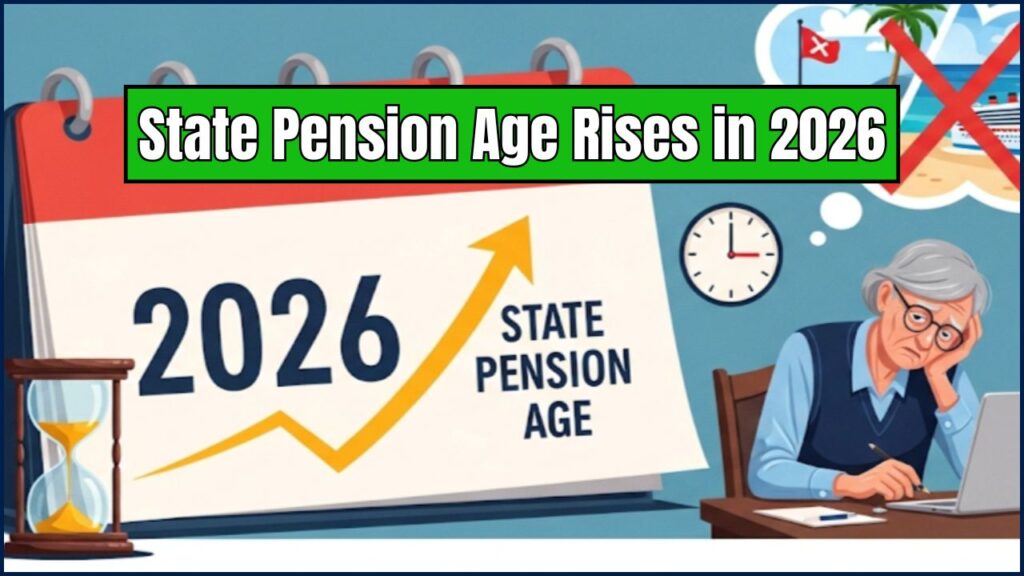Starting May 6, 2026, the State Pension Age (SPA) in the United Kingdom will begin to rise from 66 to 67, and it could seriously shake up your retirement plans if you’re not ready. This change might mean working longer, adjusting your financial game plan, or bridging a bigger income gap before you can fully kick back and relax.

This isn’t just some political headline. It’s a real-life shift that’s going to affect millions across the UK. If you’re planning your golden years or advising someone who is, you’ll want to keep reading. We’ll break this all down in simple, bite-sized chunks — whether you’re a savvy Gen X’er or a Millennial just getting serious about retirement.
State Pension Age Rises in 2026
| Feature | Details |
|---|---|
| Effective Date | May 6, 2026 |
| Old State Pension Age | 66 |
| New State Pension Age | 67 (gradually phased in between 2026 and 2028) |
| Who is Affected | Born after April 5, 1960 |
| Delay Duration | From 1 month to 12 months depending on birth date |
| Financial Impact | Potential loss of up to £16,000-18,000 in pension payments if not adjusted |
| Official Calculator | gov.uk/state-pension-age |
| Sources | GOV.UK, MoneyWeek, The Guardian, University of Bath |
The upcoming State Pension Age rise in 2026 is more than a bureaucratic change — it’s a wake-up call to reassess your retirement strategy. If you’re turning 66 soon, you might face delays of up to a year before your State Pension starts.
Use the tools available, like the official SPA calculator, and start planning now. With smart moves today, you can still enjoy a comfy, secure retirement tomorrow.
What Is the State Pension Age, Anyway?
The State Pension Age (SPA) is the age when you can start claiming your State Pension from the UK government. It used to be 60 for women and 65 for men. Then it moved to 66 for everyone. But starting in 2026, it’ll slowly shift to 67.
If you were born between April 6, 1960 and March 5, 1961, your SPA will increase by 1 to 11 months depending on your birthday. Folks born after March 6, 1961, will hit full SPA at 67.
Why the change? The government says it’s all about longer life expectancy and balancing public spending. People are living longer, so the money has to stretch further.
Real Talk: How This Hits Your Retirement Plans
Let’s say you planned to retire at 66, thinking your State Pension would kick in right away. Surprise! You might need to wait several extra months — or up to a year — before that money lands in your bank account.
That means one thing: you’ll need to bridge the gap. Either by:
- Working longer
- Drawing down from private pensions or savings
- Claiming support like Pension Credit (if eligible)
If you’re not prepared, this delay can sting. Especially when you’re counting every penny.
Added Insight: Employment Trends for Older Workers
According to the Office for National Statistics (ONS), as of 2024, more than 1 in 10 people aged 65+ are still in the workforce — a figure that’s expected to grow. The trend? Older adults are staying employed longer, whether by choice or necessity.

Employers are also recognizing the value of experienced professionals and offering:
- Flexible work arrangements
- Phased retirement programs
- Remote and hybrid roles suitable for older workers
If you’re healthy and willing, continuing to work even part-time can be both financially and socially rewarding.
Step-by-Step: How to Prepare
1. Use the State Pension Calculator
First things first, head over to the official government calculator and plug in your birthdate. It’ll tell you the exact date you’re eligible.
2. Audit Your Finances
Take a good look at your expected income sources:
- Workplace or private pensions
- Savings & investments
- Part-time work or side gigs
Estimate how much you’ll need to cover expenses if your State Pension is delayed.
3. Boost Your Contributions Now
If you’re still working, try increasing your pension contributions. Compound interest is your friend — even a small bump now can pay off later.
Also consider:
- ISAs for tax-free savings
- Sidecar savings plans for short-term emergency funds
4. Consider Phased Retirement
Instead of going cold turkey, think about reducing your hours gradually. This helps ease into retirement while still earning income.
5. Explore Deferring Your State Pension
Did you know deferring your State Pension adds 5.8% extra per year? That’s right. For every 9 weeks you wait, your payout grows.
6. Apply for Pension Credit If Needed
Pension Credit tops up your income if you’re below a certain threshold. It’s a safety net, especially for lower earners.
State Pension Age: Then vs. Now
Understanding how the State Pension age has evolved can help you prepare.
| Group | State Pension Age (Pre-2010) | State Pension Age (Current – 2025) | State Pension Age (From May 2026) |
| Women | 60 | 66 | 67 |
| Men | 65 | 66 | 67 |
Real-Life Example
Meet Jackie, born May 15, 1960. She thought she could claim her State Pension on her 66th birthday in May 2026. Nope! With the new rules, Jackie has to wait until July 2026 — that’s two months longer.
Jackie decides to:
- Delay full retirement until July
- Work part-time in the meantime
- Use some ISA savings to fill the income gap
That small change in plan keeps her financially secure.
Smart Steps for Your Retirement: Do’s and Don’ts
Don’t let the State Pension age changes catch you off guard! Here are some key tips and common myths to be aware of:
Do’s:
- Do check your State Pension forecast regularly. This gives you a clear picture of what you can expect.
- Do consider increasing your private pension contributions. Even small increases now can make a big difference later.
- Do explore voluntary National Insurance contributions. If you have gaps in your record, this could boost your State Pension.
- Do seek financial advice. A qualified adviser can help you tailor a retirement plan to your unique situation.
Don’ts:
- Don’t assume the State Pension will be enough. For most, it’s a basic income, not a comfortable retirement fund.
- Don’t ignore your workplace pension. Automatic enrolment is a powerful tool for building savings, and your employer contributes too!
- Don’t wait until the last minute. The earlier you start planning and saving, the better prepared you’ll be for retirement.
Myth Debunked: “The government will provide everything I need in retirement.” While the State Pension is a valuable benefit, it’s generally not enough to cover all living expenses comfortably. Relying solely on it could mean a significantly reduced lifestyle in retirement. Private savings and workplace pensions are crucial for a more secure future.
What’s Next? SPA Might Hit 68 Sooner Than You Think
Although SPA is set to reach 67 by 2028, there’s buzz about it rising to 68 even sooner than the original 2044-2046 timeline.
The Department for Work and Pensions is currently reviewing the policy. If it moves up earlier, people born in the early 1970s could be hit next.
FAQs
Who is affected by the 2026 State Pension Age increase?
Anyone born after April 5, 1960. Your new SPA could be anywhere from 66 years and 1 month to 67.
Can I still retire at 66 if I want to?
Sure, but your State Pension won’t start until you hit your new SPA. You’ll need to fill that gap with other income.
What happens if I defer my pension?
You get more money later. Your pension increases by about 1% for every 9 weeks you delay.
Is this related to life expectancy?
Yes. People are living longer, so the government is pushing retirement later to keep pensions sustainable.
Will the pension amount change?
Not automatically. But delaying or deferring can increase your payouts.
How does this affect self-employed workers?
Self-employed folks need to be extra proactive. Unlike employees, they don’t get auto-enrolled pensions. Consider setting up a personal pension, SIPP, or Lifetime ISA to stay on track.












